| |||
All 14 seats in Congress | |||
|---|---|---|---|
| |||
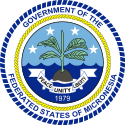 |
|---|
Parliamentary elections were held in the Federated States of Micronesia on 27 March 1979. [1] All candidates for seats in Congress ran as independents.
| |||
All 14 seats in Congress | |||
|---|---|---|---|
| |||
 |
|---|
Parliamentary elections were held in the Federated States of Micronesia on 27 March 1979. [1] All candidates for seats in Congress ran as independents.
The 14-member Congress consisted of four at-large members (one from each state) elected for four-year terms, and ten other members elected for two-year terms. [2]
| State | Seat | Elected member |
|---|---|---|
| Kosrae | Four-year | Joab Sigrah |
| Two-year | Hirosi Ismael | |
| Ponape | Four-year | Bailey Olter |
| Two-year | Peter M. Christian | |
| Bethwel Henry | ||
| Elias Thomas | ||
| Truk | Four-year | Tosiwo Nakayama |
| Two-year | Julio Akapito | |
| Masachiro Christlip | ||
| Sasauo Gouland | ||
| Kalisto Refolopei | ||
| Raymond Setik | ||
| Yap | Four-year | Petrus Tun |
| Two-year | Luke Tman | |
| Source: Highlights | ||
Following the elections, the newly elected Congress met for the first time on 10 May. Bethwel Henry was elected Speaker. Members of Congress subsequently elected Tosiwo Nakayama as the first President of Micronesia, with Petrus Tun elected vice-president. This led to both vacating their seats in Congress. In the subsequent by-elections on 13 June, Koichi Sana was elected to the four-year seat in Truk and John Haglelgam (a write-in candidate) was elected in the four-year seat in Yap. [3]

The politics of the Federated States of Micronesia (FSM) takes place in a framework of a federal assembly-independent representative democratic republic. The President of the Federated States of Micronesia is both head of state and head of government. Executive power is exercised by the president and his cabinet, while legislative power is vested in both the president and the Congress. The judiciary is independent of the executive and the legislature.

Elections in Spain encompass four different types: general elections, regional elections, local elections, and elections to the European Parliament. General elections and regional elections are typically conducted at the conclusion of the national or regional legislative mandate, which usually spans four years since the previous election. However, early elections can be called in certain circumstances. On the other hand, local council elections and elections to the European Parliament follow fixed dates, although some local government bodies, such as provincial councils, are not directly elected. In most elections, a party-list proportional representation (PR) system is employed, while the Senate utilizes the plurality system.
Elections in the Philippines are of several types. The president, vice-president, and the senators are elected for a six-year term, while the members of the House of Representatives, governors, vice-governors, members of the Sangguniang Panlalawigan, mayors, vice-mayors, members of the Sangguniang Panlungsod/members of the Sangguniang Bayan, barangay officials, and the members of the Sangguniang Kabataan are elected to serve for a three-year term.
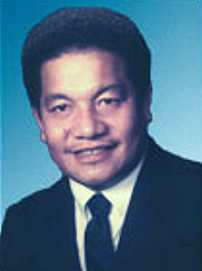
John Richard Haglelgam is a Micronesian former politician who served as the second President of the Federated States of Micronesia.

The Parliament of Ghana is the legislative body of the Government of Ghana.

Indirect presidential elections were held in the Federated States of Micronesia on May 11, 2007.
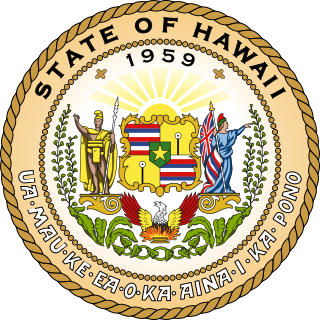
Elections in Hawaii are held for various local, state, and federal seats in the state of Hawaii. Regular elections are held every even year, although special elections may be held to fill vacancies at other points in time. The primary election is held on the second Saturday in August, while the general election is held on Election Day, which is the first Tuesday after the first Monday in November.

Parliamentary elections were held in the Federated States of Micronesia on 3 March 2009. As there were no political parties, all 21 candidates ran as independents. Three were returned unopposed.

Parliamentary elections were held in the Federated States of Micronesia on 8 March 2011, alongside a three-part referendum. As there were no political parties, all 34 candidates ran as independents. For the first time in the country's history, two women ran for election, both in Chuuk State. However, neither was elected.

Parliamentary elections were held in the Federated States of Micronesia on 4 March 2003. As there were no political parties, all 28 candidates ran as independents. Four candidates were elected unopposed.

Parliamentary elections were held in the Federated States of Micronesia on 6 March 2001. As there were no political parties, all 18 candidates ran as independents. Four candidates were elected unopposed.
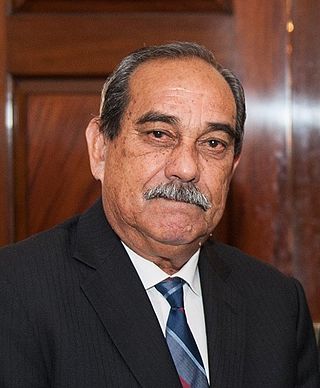
Peter Martin Christian Souissa is a Micronesian politician who served as the 8th President of the Federated States of Micronesia, from 11 May 2015 to 11 May 2019.

Parliamentary elections were held in the Federated States of Micronesia on 7 March 2017, alongside a referendum on allowing dual citizenship. Although the proposed constitutional amendment to allow dual citizenship was approved by a majority of voters, it did not pass the threshold of 75% voting in favour in at least three of the four states.

Parliamentary elections were held in the Federated States of Micronesia on 5 March 2019, alongside a referendum on calling a Constitutional Convention. All 14 seats in Congress were up for election, and all 13 incumbents standing for re-election were returned to Congress.

The Congress of Micronesia was a bicameral legislature in Trust Territory of the Pacific Islands from 1964 to 1979.
Parliamentary elections were held in the Trust Territory of the Pacific Islands on 3 November 1970.
Constitutional Convention elections were held in the Trust Territory of the Pacific Islands on 4 June 1974. Voters elected 42 members of a constitutional convention that would draw up a proposed constitution for an independent Micronesian state.
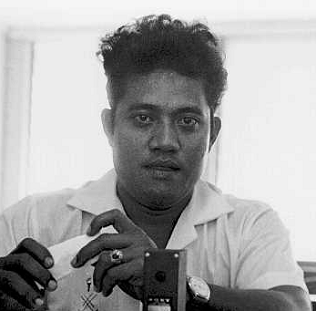
Ambilos Iehsi was a Micronesian politician. He served as a member of the House of Representatives and Senate of the Congress of the Trust Territory of the Pacific Islands between 1967 until 1979, and then as Secretary of Resources and Development of the Federated States of Micronesia.

Parliamentary elections were held in the Federated States of Micronesia on 2 March 2021, to elect ten of the fourteen seats of the Congress of Micronesia for a two-year term. There are no political parties and all candidates stood as independents.

Parliamentary elections were held in the Federated States of Micronesia on 7 March 2023 to elect the fourteen members of the Congress: ten representatives of the districts, and four senators each representing one of the four states.